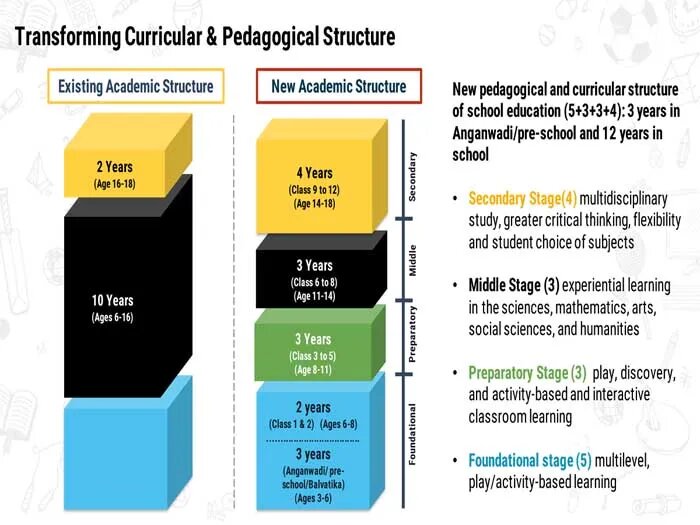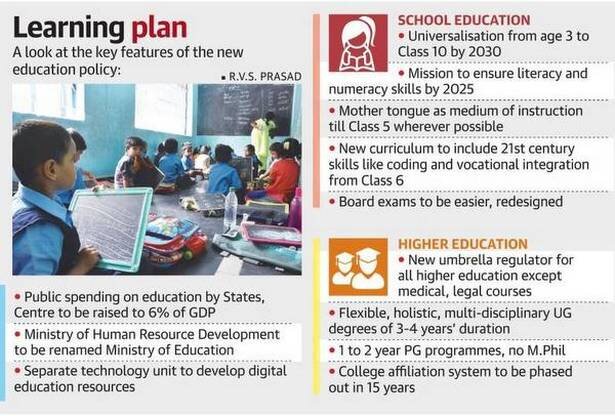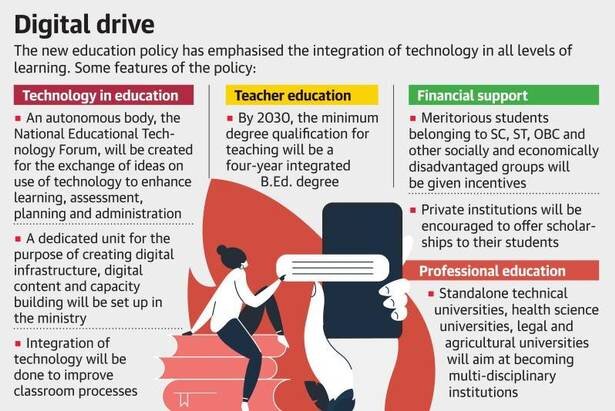National Education Policy (NEP) 2020
Click here for 👉 QUIZ ON NEW EDUCATION POLICY-2020
Recently, the Union Cabinet has approved the new National Education Policy (NEP), 2020 with an aim to introduce several changes in the Indian education system - from the school to college level.
The NEP 2020 aims at making “India a global knowledge superpower”.
The Cabinet has also approved the renaming of the Ministry of Human Resource Development to the Ministry of Education.
The NEP cleared by the Cabinet is only the third major revamp of the framework of education in India since independence.
The two earlier education policies were brought in 1968 and 1986.
Key Points
School Education:
Universalization of education from preschool to secondary level with 100% Gross Enrolment Ratio (GER) in school education by 2030.
To bring 2 crore out of school children back into the mainstream through an open schooling system.
The current 10+2 system to be replaced by a new 5+3+3+4 curricular structure corresponding to ages 3-8, 8-11, 11-14, and 14-18 years respectively.

It will bring the uncovered age group of 3-6 years under school curriculum, which has been recognized globally as the crucial stage for development of mental faculties of a child.
It will also have 12 years of schooling with three years of Anganwadi/ pre schooling.
Class 10 and 12 board examinations to be made easier, to test core competencies rather than memorised facts, with all students allowed to take the exam twice.
School governance is set to change, with a new accreditation framework and an independent authority to regulate both public and private schools.
Emphasis on Foundational Literacy and Numeracy, no rigid separation between academic streams, extracurricular, vocational streams in schools.
Vocational Education to start from Class 6 with Internships.
Teaching up to at least Grade 5 to be in mother tongue/regional language. No language will be imposed on any student.
Assessment reforms with 360 degree Holistic Progress Card, tracking Student Progress for achieving Learning Outcomes
A new and comprehensive National Curriculum Framework for Teacher Education (NCFTE) 2021, will be formulated by the National Council for Teacher Education (NCTE) in consultation with National Council of Educational Research and Training (NCERT).
By 2030, the minimum degree qualification for teaching will be a 4-year integrated B.Ed. degree.
Higher Education:

Gross Enrolment Ratio in higher education to be raised to 50% by 2035. Also, 3.5 crore seats to be added in higher education.
The current Gross Enrolment Ratio (GER) in higher education is 26.3%.
Holistic Undergraduate education with a flexible curriculum can be of 3 or 4 years with multiple exit options and appropriate certification within this period.
M.Phil courses will be discontinued and all the courses at undergraduate, postgraduate and PhD level will now be interdisciplinary.
Academic Bank of Credits to be established to facilitate Transfer of Credits.
Multidisciplinary Education and Research Universities (MERUs), at par with IITs, IIMs, to be set up as models of best multidisciplinary education of global standards in the country.
The National Research Foundation will be created as an apex body for fostering a strong research culture and building research capacity across higher education.
Higher Education Commission of India (HECI) will be set up as a single umbrella body for the entire higher education, excluding medical and legal education. Public and private higher education institutions will be governed by the same set of norms for regulation, accreditation and academic standards. Also, HECI will be having four independent verticals namely,
National Higher Education Regulatory Council (NHERC) for regulation,
General Education Council (GEC) for standard setting,
Higher Education Grants Council (HEGC) for funding,
National Accreditation Council (NAC) for accreditation.
Affiliation of colleges is to be phased out in 15 years and a stage-wise mechanism to be established for granting graded autonomy to colleges.
Over a period of time, every college is expected to develop into either an autonomous degree-granting College, or a constituent college of a university.
Other Changes:

An autonomous body, the National Educational Technology Forum (NETF), will be created to provide a platform for the free exchange of ideas on the use of technology to enhance learning, assessment, planning, administration.
National Assessment Centre- 'PARAKH' has been created to assess the students.
It also paves the way for foreign universities to set up campuses in India.
It emphasizes setting up of Gender Inclusion Fund, Special Education Zones for disadvantaged regions and groups.
National Institute for Pali, Persian and Prakrit, Indian Institute of Translation and Interpretation to be set up.
It also aims to increase the public investment in the Education sector to reach 6% of GDP at the earliest.
Currently, India spends around 4.6 % of its total GDP on education.
Way Forward
A New Education Policy aims to facilitate an inclusive, participatory and holistic approach, which takes into consideration field experiences, empirical research, stakeholder feedback, as well as lessons learned from best practices.
It is a progressive shift towards a more scientific approach to education. The prescribed structure will help to cater the ability of the child – stages of cognitive development as well as social and physical awareness. If implemented in its true vision, the new structure can bring India at par with the leading countries of the world.
-----------------------------------------------------------------------------------------------------------------------------
Education In India
Constitutional Provisions:
Part IV of Indian Constitution, Article 45 and Article 39 (f) of Directive Principles of State Policy (DPSP), has a provision for state-funded as well as equitable and accessible education.
The 42nd Amendment to the Constitution in 1976 moved education from the State to the Concurrent List.
The education policies by the Central government provides a broad direction and state governments are expected to follow it. But it is not mandatory, for instance Tamil Nadu does not follow the three-language formula prescribed by the first education policy in 1968.
The 86th Amendment in 2002 made education an enforceable right under Article 21-A.
Related Laws:
Right To Education (RTE) Act, 2009 aims to provide primary education to all children aged 6 to 14 years and enforces education as a Fundamental Right.
It also mandates 25% reservation for disadvantaged sections of the society where disadvantaged groups
Government Initiatives:
Sarva Shiksha Abhiyan, Mid Day Meal Scheme, Navodaya Vidyalayas (NVS schools), Kendriya Vidyalayas (KV schools) and use of IT in education are a result of the NEP of 1986.


No comments:
Post a Comment